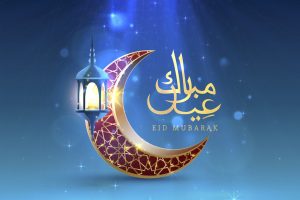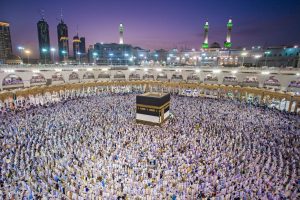
Eid-ul-Fitr is celebrated by Muslims across the globe and it is a time of joy, reflection, sacrifice and contemplation. © Allies Interactive | Shutterstock
Eid-ul-Fitr is a festival celebrated by millions of Muslims around the world at the end of the holy month of Ramadan. Fasting is obligatory upon all healthy Muslims who are not travelling or subject to certain other conditions. The word Eid-ul-Fitr is comprised of two separate words: Eid and Fitr. The word Eid means something which returns over and over. Hence, Eid refers to the kind of happiness which comes again and again. This word is only used in one instance in the Holy Qur’an, in reference to the disciples of the Prophet Jesusas. The Holy Qur’an mentions in Surah Al-Ma’idah, Chapter 5, verse 115:
“Said Jesus, son of Mary, ‘O Allah, our Lord, send down to us a table from heaven spread with food that it may be to us a festival [Eid], to the first of us and to the last of us, and a Sign from Thee; and provide sustenance for us, for Thou art the Best of sustainers.’”
The word Fitr means to break or open the fast. Hence, Eid-ul-Fitr is the oft-returning festival of the breaking of the fast.
Practices of the Holy Prophet Muhammadsa on Eid-ul-Fitr
The first Eid-ul-Fitr was celebrated by the Holy Prophetsa in the second year of Hijra (the migration from Makkah to Madinah). It was in this year that fasting during the month of Ramadan was divinely ordained to Muslims. Incidentally, the Battle of Badr was also fought during the month of Ramadan in that same year. It is mentioned in the books of Ahadith that the Holy Prophetsa was still weak from the fatigue of the battle, and that he had to be supported on the shoulders of Hazrat Bilalra whilst delivering the Sermon.1

© Pambudi Yoga Perdana | Shutterstock
Traditionally, the Holy Prophetsa used to offer the Eid prayers in a spacious, open place rather than the mosque. After offering the two Raka’ats (units of Salat) of the Eid prayer first, he would then turn around and deliver the Eid Sermon while the congregation remained seated.2 The Holy Prophetsa would also walk to where the Eid prayers were being held rather than using some other mode of transport and would use a different route on his return.3
It was also the practice of the Holy Prophet Muhammadsa that he would eat something sweet (usually dates, and always an odd number) before going for the Eid prayers. This was the opposite of his practice for Eid-ul-Adha, where he fasted before prayer and only opened the fast with the meat of the sacrificial animal.4
The Holy Prophet Muhammadsa directed that all women, whether young, old or not offering prayers, should still attend the Eid prayers. After delivering the Eid Sermon, the Holy Prophetsa would visit the ladies’ area and would offer them advice and guidance.5
The sermons of the Holy Prophetsa, which have been recorded in the books of Ahadith, tell us that Prophet Muhammadsa used to praise and glorify Allah Almighty on the day of Eid in an extra special manner. In one of the sermons, the Holy Prophetsa emphasised that one should stay away from any innovations in Islam. He also mentioned in one of his Eid Sermons that “Al-Sa’at, i.e., the Day of Resurrection, and I are together like these two fingers of mine.” Hazrat Jabirra narrates that when the Prophetsa of Allah mentioned the Day of Resurrection, his face became red and his voice became loud and awe-inspiring and it was as if the Holy Prophetsa was warning them of a huge army about to attack.6

© Samet Guler | Shutterstock
In the very first Eid Sermon, the Holy Prophet Muhammadsa guided people to always tread the path of righteousness and to obey the Prophet of Allahsa in all matters. Afterwards, the Holy Prophetsa went to the ladies’ area and advised them to give Sadaqah (charity) in order to prevent becoming the fuel of hellfire. Upon hearing this, one of the ladies stood up and asked: “O Prophetsa of Allah, why have you singled out women?” The Holy Prophetsa replied, “It is because you complain too much, and you are ungrateful to your husbands.” Upon the admonishments of the Holy Prophetsa, the women immediately took off their jewellery and gave it for charity there and then.7
The people of Madinah used to gather and have celebrations and festivities for two days of the year. The Holy Prophetsa told them that Allah had in fact given them two even better days of festivals, i.e., Eid-ul-Fitr and Eid-ul-Adha.8 The Holy Prophet Muhammadsa allowed and encouraged Eid-ul-Fitr to be a day of the remembrance of Allah Almighty, as well as a day of general happiness and festivities. Hazrat ‘A’ishahra narrates that once on the day of Eid, the Holy Prophetsa came into the house and two girls were singing songs and playing a simple instrument. The Holy Prophetsa came and lay down on the bed and did not say anything. Hazrat Abu Bakrra then came into the house and became angry, and asked the girls to stop singing. The Holy Prophetsa stopped Hazrat Abu Bakrra and asked the girls to continue singing.9

© szefei | Shutterstock
On another occasion, arrangements were made on the day of Eid for some visiting Africans to present a circus-like show with spears and swords in the courtyard of the mosque of the Prophetsa. The Holy Prophetsa inquired of Hazrat ‘A’ishahra if she would also like to see the festivities and so she watched the entertainment standing behind the Holy Prophetsa, with her head resting on the shoulders of the Prophetsa. The Holy Prophetsa stood in this manner and asked for the circus to continue until Hazrat ‘A’ishah’sra curiosity was satisfied and she herself became tired.10
The Promised Messiahas also used to celebrate Eid-ul-Fitr in the same way as mentioned in the Ahadith. Once the Promised Messiahas had sweet rice cooked especially for all of his companions gathered for the day of Eid. Similarly, during the time of Hazrat Khalifatul Masih IIra, children used to sing poems and sports were played to reflect the happy mood of Eid.11
Eid as a Continuation of the Message of Ramadan
Eid-ul-Fitr is celebrated at the end of the blessed month of Ramadan and in essence, it is the celebration of the favour of Allah Almighty that He allowed his followers another opportunity to spend the month of Ramadan occupied in His worship. The philosophy of Eid-ul-Fitr is not to celebrate the end of fasting, but rather to continue on one’s spiritual journey. There are two main messages enshrined in the month of Ramadan, namely, worship of Allah, and the realisation of the pains and sorrows of other human beings. Eid-ul-Fitr is the continuation of both these messages. It is a day of celebration where in addition to the five obligatory (daily) prayers, the believers also gather for a sixth congregational prayer to remember Allah Almighty and be thankful for His blessings.

© Tressie Davis | Shutterstock
Similarly, the month of Ramadan is a reminder that there are many in this world who have to suffer the pangs of thirst and hunger on a regular basis. This realisation is supposed to make a believer empathise and sympathise with the less fortunate, and should make a believer spend more of his money on charity in order to benefit those who are lacking. Eid is a continuation of this message as well, and a reminder that the philosophy of the month of Ramadan needs to be adopted throughout the rest of the year as well. That is why the Holy Prophetsa prescribed a special charity upon every Muslim known as Fitrana (obligatory alms for the poor and needy to be given on or before Eid-ul-Fitr) to be collected before the Eid Prayers and to be distributed to the needy so that they may also enjoy celebrating the festival of Eid.
Eid as a Reminder of Sacrifice
As mentioned earlier, the word Eid is used in the Holy Qur’an on only one occasion, in reference to the disciples of Jesusas. So, there is no direct mention of an Islamic “Eid” in the Holy Qur’an. However, a closer study of the Holy Qur’an reveals that Allah mentions not a day but eras of happiness in reference to the Muslims after mentioning the importance of sacrifice. The Holy Qur’an states in Chapter 9, verse 111:
“Surely, Allah has purchased of the believers their persons and their property in return for the Garden they shall have.”
Similarly, the last verses of Chapter 61 of the Holy Qur’an clearly explain that those who sacrifice in the way of Allah shall have a great reward from Him and shall see great happiness.
Sacrifices are of two types: individual sacrifice and communal sacrifice. Eid-ul-Fitr is a celebration and reminder of personal sacrifice, whereas Eid-ul-Adha signifies communal sacrifice. Every Muslim makes great sacrifices during the month of Ramadan by abstaining from that which is permissible, such as food and drink, and offering extra prayers throughout the night. Even those who are legitimately unable to fast make sacrifices by offering extra prayers during this blessed month. Eid-ul-Fitr is a reminder that after every sacrifice there is a time of happiness and celebration, but a believer should not forget the lessons learned from these sacrifices. That is why Allah has prescribed an extra prayer on the day of Eid, to teach the believer that although his period of great sacrifice may have ended and fasting is no longer required, nevertheless he should not forget the spiritual lessons learnt.
The specific verse in the Holy Qur’an which mentions the word Eid, quoted at the beginning of this article, is also a reminder of this fact. The early Christians went through a period of great sacrifice and persecution but as a result they were promised and given great worldly bounties. Allah clearly mentions in that verse that during this time of happiness and festivities, or Eid, one should not forget these sacrifices; otherwise it will result in the most grievous punishment from Allah the Almighty. Hence, Eid-ul-Fitr is a reminder that Allah has blessed us with great happiness as a result of the sacrifices made during the month of Ramadan but if we forget the lessons of these sacrifices then our Eid will not be an Eid of true happiness, as a grievous punishment from Allah awaits us.
Eid as the Day of Freedom from Bondage
The month of Ramadan is a special blessing from Allah which enables us to break free from the slavery of various bad habits, if it is observed properly. A person can break free from various addictions during this blessed month such as laziness and lethargy, excess eating, cursing, backbiting and lying, etc. If a person understands the true message of Ramadan, the world can also break free from economic slavery and the bondage of poverty and hunger. Hence, a person who goes through the month of Ramadan faithfully, while analysing one’s self, as the Holy Prophetsa did, will surely be freed from various chains and shackles. In this sense, the day of Eid is indeed a day of great celebration and happiness as it is the day of true freedom and independence for man.
True freedom from sinful existence requires true repentance. The Promised Messiahas says regarding this:
“All the people should remember that Allah the Almighty has fixed such days in Islam which are considered days of happiness and He has put great blessings in those days. Among them is the day of Friday which is a very blessed day. Then there are the two Eids in Islam which are considered days of great happiness and Allah has put amazing blessings in them. But one should remember that although these days are days of happiness and blessing in their own right but there is another day which is a day of much more happiness and greater blessings. But unfortunately it is seen that people do not look forward to that day nor do they search for that day. In reality if people were aware of the blessings and goodness of that day then they would have considered the day a great reward. Which day is that which is better and more blessed then the day of Jumma and the Eidain [two Eids]? I tell you that it is the day of a man’s repentance which is greater than all days and all Eids. Because that day his bad record of sins which was bringing him closer to the hellfire and bringing him under the wrath of God is wiped clean and all his sins are forgiven. Which day can be greater and happier for a person then the day which saves him from eternal hellfire and the wrath of God? The sinner who repents was previously far away from God’s grace and close to his wrath but now he is brought close to God’s grace and mercy and removed from the punishment of fire.”12
Eid as the Day to Meet our Beloved
The day of Eid has a special connection with the meeting of loved ones. It is a day when we not only go to the houses of our relatives, but we embrace even those who we may not know personally, after the Eid Sermon. The poetry of many languages, especially Urdu, is full of beautiful allegories about the day of Eid and the meeting of the beloved. The true spiritual philosophy of Eid is also the philosophy of the meeting of the beloved as illustrated by the beautiful Hadith of the Holy Prophetsa.
Prophet Muhammadsa stated that Allah says, “All the deeds of Adam’sas sons are for them, except fasting which is for Me, and I am the reward for it.”13
Hence, the real Eid is for those who were able to develop a relationship with their beloved Allah during the month of Ramadan. Eid is also a reminder that some meetings, some relationships, are temporary, and though we find happiness from these temporary acquaintances, the real happiness is meeting one’s beloved permanently and being one with Him forever. Many of us find the joy of meeting with our beloved Lord during the month of Ramadan but this relationship does not last beyond the month. Eid is a reminder that the true happiness of meeting one’s beloved is making Him one’s forever and never letting go.
Eid as the Era of the Promised Messiahas
The advent of the Promised Messiahas can also be likened to Eid as it is a source of happiness for Muslims. It is an era which was prophesied by the Holy Qur’an, in which Islam was to become victorious over all other religions. It is an era in which according to the prophecies of the Holy Prophet Muhammadsa, Islam was to regain its lost glory through prayers and developing a true relationship with Allah the Almighty. This point is also illustrated in one of the revelations of the Promised Messiahas in which he says: “Felicitation on the coming of the Eid [Festival]. It is Eid [Festival], celebrate it or not.”14
Hazrat Khalifatul Masih IIra elucidates concerning this revelation that, “It points to the appearance of the Promised Messiahas. The appearance of the Prophets is an Eid [festival]. That is, by their appearance, the days of the manifestation of God’s grace descend upon the earth and the seed of progress is sown. The seed grows slowly into such a big tree that the whole world benefits from its fruits and shade. But many people fail to recognise that Eid and turn themselves aside…It does not mean that it does not make any difference whether you celebrate or not. But it is like the expression: ‘He is truthful; whether you agree or not.’ Meaning that the blessing has been made available; it is up to the people to benefit from it or not.”15
Hence, the time of the Promised Messiahas is an era of Eid, and every Eid-ul-Fitr is a reminder that we must fulfil our duties to fully benefit from this celebration of Eid as well.
May Allah the Almighty enable us to understand the true philosophy and spirit of Eid-ul-Fitr and may our Eid be an Eid of true happiness; one where we meet those whom we love and then continue the spiritual progress we have made throughout Ramadan.
About the Author: Talha Ali a young Imam serves as National President and Missionary In-Charge for the Ahmadiyya Muslim Community in the Philippines. He has spoken at various interfaith dialogues and radio programs.
Endnotes
- Khutbat-e-Tahir, Eidain, p. 166.
- Ibid., p. 254.
- Ibid., p. 257.
- Ibid., p. 260.
- Ibid., p. 251.
- Ibid., p. 167.
- Ibid., p. 171.
- Ibid., p. 257.
- Ibid., p. 171.
- Ibid., p. 172.
- Ibid., pp. 262-263.
- Malfuzat, Vol. 4, pp. 114-115.
- Sahih Bukhari 7538, Book 97, Hadith No.163.
- Tadhkirah, English Ed. p. 981.
- Hazrat Mirza Bashir-Ud-Din Mahmud Ahmadra, Khutbat-e-Mahmud, Eid-ul-Fitr, Vol. 1, pp. 163-164.




Add Comment